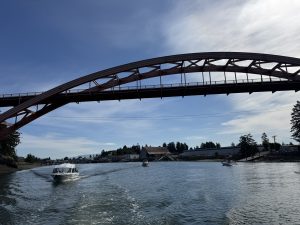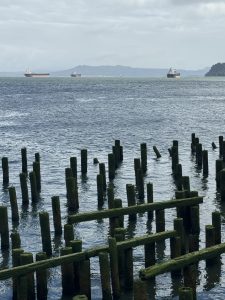Top-Rated Longshore Accident & Injury Lawyers
The longshore lawyers at BoatLaw, LLP (formerly Anderson Carey Williams & Neidzwski) have decades of experience litigating personal injury and death claims for longshoremen around the country. When you work with us, you can expect competent-but-compassionate care from top-rated attorneys focused solely on maritime and admiralty cases.
Call Us at 1-800-BOATLAW (1-800-262-8529) for a free case review. You can also contact us online and a member of our legal team will be in touch shortly.
Notable Longshore Claims & Case Results
We are known for the compassionate care we give our clients and our long history of successful case results for longshoremen and dock workers.
| Compensation Awarded | Description |
| $10,000,000 | Judgment for a harbor worker |
| $3,500,000 |
Settlement for an injured longshoreman
|
| $2,800,000 |
Settlement for a harbor worker who fell on a dry bulk carrier
|
| $525,000 |
Result for a longshoreman injured while undocking a tanker
|
See More Recent Case Results ->
How Longshore Claims & Injury Cases Work
How to File a Longshore Claim or Injury Report
- See if you only qualify for a longshore claim or if you’re eligible for a Jones Act case by consulting a longshoremen attorney
- Your attorney will file your claim for you and walk you through each step
- How long this process takes will vary, but in our experience, most longshore injury claims are resolved in 12 to 36 months
Contact us to begin filing your longshore injury claim ->
BoatLaw’s Nationally Recognized Longshore Lawyers

Douglas R. WilliamsDouglas R. Williams was raised in a military family. After retiring from the armed forces, his father sailed as the chief medical officer with several of the world’s prominent cruise lines, including Holland America Line, Carnival Cruise Line, Disney Cruise Line, and Norwegian Cruise Line. Doug spent a good part of his youth—when not in school—living in crew quarters aboard ships, sailing with his father. These experiences shaped his career by giving him firsthand exposure to the maritime industry from an early age. Read Doug’s lawyer profile. |

Nicholas J. NeidzwskiNicholas J. Neidzwski is an accomplished trial attorney who handles maritime and personal injury litigation. Nick’s litigation experience includes the successful resolution of various Jones Act, general maritime, and product liability cases on behalf of many different individuals against various companies, including some of the largest maritime corporations in the United States. He has appeared for plaintiffs in state and federal courts throughout Washington, California, Oregon, and Alaska, and has established a reputation as a dedicated advocate for injured individuals and their families. Read Nick’s lawyer profile. |
Law Firm Reviews
Don’t take our word for it, hear what clients have to say about the maritime attorneys at BoatLaw, LLP.
| The people at BoatLaw,LLP have truly been a Godsend. They fought for me when things were looking so tough for my future. Through their hard work, we were rewarded the maximum policy limit for my injury. I was able to get care at the top hospital in California and number two in the entire nation.
When you are hurt it is very hard to keep fighting everyday. Nick, Allyssa and the rest of his team personally checked on me, fought till we won and continues to support me through this stressful process. I would 100% recommend them. I’ve read reviews like this before and tbh didn’t fully believe them. But BoatLaw really went above and beyond for me. I had no hope, no money, and was severely hurt. Just having someone on your side that cares is huge. Im glad this whole thing is over but I am going to miss Nick,Alyssa,and the whole team at BoatLaw. They never gave up on me even when I wanted to give up. This group of people are amazing and I’m truly grateful for everything they have done for me. Thank you Nick, Alyssa, and the rest of the BoatLaw team, I’ll be forever grateful to you guys.” Devon Davis |
“If you told me 2.5 years ago I would be writing a glowing review for Lawyers and a Law Firm of my own free will, I would have laughed at you. Well here I am. After a personal injury, in which I fully blamed another party, I did much soul searching and decided to retain an attorney. After many phone calls to Attorneys in Seattle and New York City, I was directed to BoatLaw, LLP.
I believe Nick Neidzwski… of BoatLaw, LLP represented me to the fullest of their ability. They were honest, up front about how things would go, kept clear and concise communication with me. They informed me in advance of the risks and were very open about the process and how things would proceed. Nick called weekly to update me. When the opposition threw wrenches into our works, Nick worked tirelessly into the night to afford me the best representation anyone could want… Through their use of experts, joint examinations, depositions, medical records they were able to satisfactorily prove my case well enough that the other side settled. They also got me more than I expected. Their support staff at the office, especially Laura, were excellent and professional. They always made me feel welcome. I would highly recommend them!” Scott King |
“From the moment I was introduced to Nick and his team… eased my worries and made me feel secure that there were really good people working on my behalf.
And boy did they work. My case was not an easy one. There were a lot of firsts for everybody. Nick, Assal, and the rest of his team pushed through every hurdle lobbed our way with grace and poise, handling each new obstacle with apparent ease. One of my favorite things was that I got to be super hands off. I only joined the process when I was able to — or when I was required to — and no more than that. Life is very unfair, often to the same people over and over again. Luckily, life has also given us Nick and his team, a group of people who have dedicated their lives to helping people in some of the worst possible situations. And they’re so good at it. Great at it! And compassionate and caring and respectful and kind. There aren’t enough adjectives, and there isn’t enough data storage, to describe or hold the amount of gratitude I have for the amazing people that work here and at his other locations.” Autumn Rose |
See more reviews of BoatLaw, LLP ->
Where We Handle Longshore Claims and Injury Cases
The legal team at BoatLaw, LLP is ready to assist longshore workers injured anywhere near Washington, California, Oregon, Alaska, and Florida. Areas we serve include:
| State | Description | Top Ports |
| Washington | Maritime law offices in Bellingham and Seattle. | |
| Oregon | Maritime law office in Portland. | |
| California | Maritime law offices in San Francisco and Los Angeles. | |
| Alaska | Longshore lawyers serving Alaska |
|
| Florida | Longshore lawyers serving Florida |
Longshore Accident, Injury, and Claims FAQ
What Is the Legal Process for Longshore Claims?
The legal process for filing a claim under LHWCA involves several steps. When a longshore worker is injured on the job, the initial step is to notify the employer within 30 days and seek medical treatment authorized by Form LS-1. The claim process involves filing Form LS-201 with the employer and a compensation claim using Form LS-203 within the time frames. Claims are filed at the Office of Workers Compensation Programs (OWCP) and managed by district offices.
If a claim under LHWCA is denied, the victim can request an informal conference with the District Director of the OWCP to attempt resolution. If unresolved, the claim can be referred for a formal hearing before an ALJ. Decisions by the judge can be appealed to the Benefits Review Board and, if necessary, to the U.S. Court of Appeals.
 What Happens to Appeals Filed With the Benefits Review Board?
What Happens to Appeals Filed With the Benefits Review Board?
Within 30 days of the filing of the decision, the parties can file an appeal as explained in 20 C.F.R. § 702.393. The instructions for filing an appeal are on a notice accompanying the copy of the decision that both parties receive from OWCP.
If any party files a Motion for Reconsideration, the deadline for filing an appeal with the Board is delayed until the ALJ issues an Order on Reconsideration.
Once the Board dockets an appeal, it issues a Notice setting out the briefing schedule and procedural requirements. The Board may affirm, reverse or modify the ALJ’s decision. Additionally, it may remand the case for further proceedings before the ALJ. After the Board issues its decision, any further proceedings go to the federal circuit courts of appeal. This excludes some Defense Base Act cases which are appealed to federal district court.
The Benefits Review Board exercises the appellate review authority executed by the United States District Courts prior to 1973. The decisions of the Benefits Review Board may be appealed to the United States Courts of Appeals, and from there on to the United States Supreme Court.
What Happens in a Longshore Claim Hearing?
At the hearing on the longshore claim, the parties will be given the opportunity to call witnesses to testify and present evidence as provided in 20 C.F.R. § 702.338 et seq. A court reporter will create the official record of the proceeding.
The ALJ’s decision and order will be prepared within 20 days of the completion of the hearing. Compensation must be paid within 10 days after it becomes due. Both parties will be mailed a copy of the decision within 24 hours of the day of filing. Any party can request a reconsideration of the decision. However, the Motion for Reconsideration must be filed within 10 days of the filing of the decision as required by 20 C.F.R. § 802.206.
Who Has Jurisdiction Over Longshore Injury Claims?
Jurisdiction over cases involving LHWCA primarily lies with the U.S. Department of Labor’s Office of Administrative Law Judges (ALJs). These administrative law judges are responsible for conducting hearings and issuing decisions on disputes related to claims under LHWCA. It’s a specialized process distinct from traditional court systems, designed to address the specific needs of maritime workers and their employers.
Where are Longshore Claims Filed?
All longshore claims are filed at the Office of Workers Compensation Programs (OWCP), Division of Longshore and Harbor Workers’ Compensation (DLHWC) and assigned to a district office.
The Seattle Longshore District Office handles claims in:
- Alaska
- Oregon
- Washington
- Colorado
- Idaho
- Montana
- North Dakota
- South Dakota
- Utah
- Wyoming
The San Francisco Longshore District Office handles claims in:
- California (north of the northern boundaries of the counties of San Luis, Obispo, Kern, and San Bernardino)
- Arizona
- Nevada
The Long Beach Longshore District Office for claims in California (south of the northern boundaries of the counties of San Luis, Obispo, Kern, and San Bernardino).
The parties to the claim including the claimant, employer, and insurance carrier are permitted to request an “informal conference” with the District Director or Claims Examiner. After the informal conference, the Claims Examiner issues a recommendation.
Any of the parties can request a formal hearing from the Office of the Chief Administrative Law Judges (OALJ) as provided in 20 C.F.R. § 702.331 et seq. Additionally, the parties can request the case be referred to OALJ without an informal conference.
 Longshore Claims Transferred to OALJ
Longshore Claims Transferred to OALJ
After a request for the case to be transferred to the Office of Administrative Law Judges (OALJ), the OALJ will assign a docket number to the claim. The OALJ will then send it to the appropriate office to be included in an administrative law judge’s (ALJ) case docket.
The ALJ will then schedule the hearing. The ALJ will provide a Notice of Hearing to set a time and place for the hearing. Prior to the hearing, the parties will engage in the discovery process by taking depositions or serving interrogatories. The parties can request that the OALJ issue a subpoena if documents are needed.
If the parties reach a settlement prior to the hearing, the parties can request the involvement of a “Settlement Judge”, who can set up a meeting in order to discuss settling the claim.
What Are the Potential Damages for Injury and Wrongful Death Claims Under the LHWCA?
- Medical Expenses: this coverage extends beyond immediate medical treatments and hospitalizations to also cover long-term rehabilitation, follow-up treatments, and any essential medical equipment needed for recovery. The goal is to ensure that injured workers receive the necessary medical care for as complete a recovery as possible, without the burden of medical costs.
- Lost Wages: for workers who are temporarily unable to return to their jobs due to injury, the LHWCA offers compensation for lost wages. This compensation is typically calculated at two-thirds of the worker’s average weekly earnings, providing a substantial support during the recovery period. This benefit ensures that the worker can focus on recovery without worrying about their income.
- Permanent Disability Compensation: in cases where an injury leads to permanent disability, the LHWCA provides additional compensation. This is designed to reflect the loss of earning capacity, acknowledging the significant impact a permanent disability can have on a worker’s ability to earn an income. The compensation varies depending on the nature and severity of the disability.
- Funeral Expenses (Wrongful Death): recognizing the immediate financial burden that can accompany the loss of a loved one, the LHWCA covers funeral and burial expenses up to a specified limit.
- Loss of Income (Wrongful Death): compensates survivors for the loss of income resulting from their loved one’s death. This compensation is particularly important for dependents, such as spouses and children, who relied on the deceased’s earnings for their daily living and future financial security. The act ensures that these survivors receive a portion of the deceased’s average weekly wages.
What Are Third-Party Longshore Claims?
A third-party claim under LHWCA allows injured maritime workers to seek compensation from organizations other than their employer, like ship owners, equipment manufacturers or other contractors, whose negligence contributed to their injuries. Maritime workers eligible for these claims include harbor workers, shipbuilders, and dock workers, among others.
Also, a 33 USC 905(b) claim refers to a specific provision under LHWCA that allows injured maritime workers to file negligence claims against vessel owners, distinct from the standard workers’ compensation benefits the LHWCA typically provides. Under 905(b), workers who suffer injuries due to the negligence of a vessel owner—this includes conditions of the vessel, actions of the crew, or other negligent behaviors contributing to unsafe working conditions—can pursue damages that go beyond the workers’ compensation scheme. These damages can include pain and suffering, full lost wages, and future earning capacity, which are not covered under standard workers’ compensation claims.
The claim process under 905(b) requires the injured worker to prove that the vessel owner’s negligence directly contributed to their injury. This might involve showing that the owner failed to maintain a safe working environment on the vessel, improperly secured cargo, or any action that breached their duty of care towards the workers.
What Is the Role of Insurance Companies as It Relates to the LHWCA?
Insurance companies provide the necessary workers’ compensation insurance coverage to employers. These companies assess claims, pay out benefits for medical care and wage replacement, and may be involved in disputes over the extent of a worker’s injuries or eligibility for benefits. Employers are required to have LHWCA insurance to ensure they can fulfill their obligations to injured workers under the Act.
What Are Common Defenses Against LHWCA Injury Claims?
Common defenses against injury claims under LHWCA include disputing the extent of the injury or arguing that the injury did not occur within the scope of employment. Employers may also challenge the claim by demonstrating that the injury resulted from the worker’s intoxication or willful intention to harm themselves or others. Additionally, employers might claim that the individual is excluded from coverage under the LHWCA.
Additional Legal Resources for Longshore Claims
- Longshore and Harbor Workers’ Compensation Act Frequently Asked Questions: This resource, provided by the Office of Workers’ Compensation Programs, clarifies common questions about coverage, claims, and benefits. OWCP explains that LHWCA provides compensation, medical care, and vocational rehabilitation services for workers disabled from injuries that occur on U.S. navigable waters or nearby areas used in unloading, loading, building, or repairing a vessel. The Act also covers occupational diseases and offers survivor benefits for dependents to the extent that the injury causes the employee’s death.
- 33 U.S. Code Chapter 18 – Longshore and Harbor Workers’ Compensation: View this site for the official text of LHWCA. The law includes details on coverage, liability, compensation rates, and the process for filing claims. It’s a resource for understanding the rights and obligations of both workers and employers under federal law.
- Proposed Rule on Civil Money Penalties Procedures Relating to Longshore and Harbor Workers’ Compensation Act – Federal Register: This proposed rule by the OWCP suggests new regulations for imposing and reviewing civil money penalties under the LHWCA. The changes are intended to clarify procedures for challenging penalties, ensuring a transparent and fair process for all parties involved.
Work With Our Trusted Longshore Injury Lawyers

If you have suffered injuries working in a maritime environment, your first step should be to contact an experienced maritime attorney. Fishing and boating companies are usually reluctant to or admit wrongdoing and provide the compensation that you deserve, and having strong representation helps apply the necessary pressure.
The maritime lawyers at BoatLaw, LLP have decades of experience fighting for worker’s claims across the U.S. and are ready to fight aggressively for any injuries you may have experienced working as a maritime worker.
Contact us today to champion your cause and navigate the complexities of maritime claims, ensuring that your rights are fiercely protected and your future is secured.
Call 1 (800) 262-8529 for a free longshore claim review and consultation.
Do not settle for less than what your case is worth!



 What Happens to Appeals Filed With the Benefits Review Board?
What Happens to Appeals Filed With the Benefits Review Board? Longshore Claims Transferred to OALJ
Longshore Claims Transferred to OALJ











